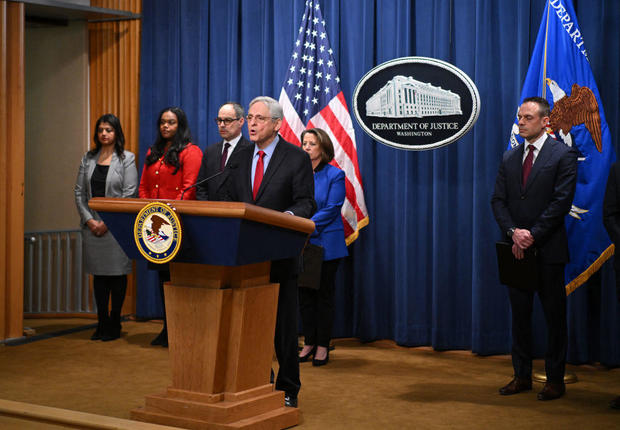
The United States has initiated a groundbreaking legal action against Apple, alleging that the company has hindered competition in the technology industry.
Washington — Apple Inc., one of the world’s most valuable and influential companies, illegally engaged in anti-competitive behavior in an effort to build a “moat around its smartphone monopoly” and maximize its profits at the expense of consumers, the Justice Department alleged in a blockbuster antitrust lawsuit filed Thursday.
The Justice Department has filed a complaint in a federal district court in New Jersey, accusing the company of utilizing its app development guidelines, iPhone functions, and hardware that are regularly used by customers, such as iMessage, Apple Wallet, and smartwatches, to hinder competition and boost profits through higher pricing. Fifteen states and the District of Columbia have joined the Justice Department as plaintiffs in the lawsuit.
At the Justice Department, Attorney General Merrick Garland stated that Apple’s dominance in the smartphone industry is not solely due to their superior performance, but also by breaking federal antitrust regulations. He believes that consumers should not be burdened with inflated prices as a result of companies disregarding the law.
According to a complaint that spans 88 pages, government lawyers have accused Apple of breaking the Sherman Antitrust Act by using flexible rules and limitations in their App Store policies and agreements. These actions allegedly allowed Apple to charge higher fees, stifle innovation, provide a less secure or deteriorated user experience, and limit competition.
According to allegations, the tech company, which earned about $400 billion in revenue last year, unfairly excluded its smaller rivals by hindering the growth of “super apps” that offer the same services on different devices; interfering with the exchange of messages and features between Apple and non-Apple products; and controlling the use of tap-to-pay features on iPhones exclusively with Apple Wallet.
For a while now, users have been discontent with the differences in messaging experiences between Apple and non-Apple devices. These discrepancies include lower quality media, limited editing options, and even varying colors for the messages. According to Garland, these problems are just ways for Apple to convince users to continue using their products within their ecosystem.
According to the speaker, Apple engages in anti-competitive behavior by deliberately hindering communication between iPhone users and those with non-Apple devices. This can be seen through the limitations placed on its own messaging app and third-party messaging apps, causing iPhone users to experience difficulties such as green text messages and poor-quality videos.
iPhone
The usage of cloud streaming, location services, and web browsers on iPhones was utilized to eliminate competition from smaller companies.
According to the complaint, Apple’s actions that impede competition in the smartphone industry have a widespread impact on related industries such as finance, fitness, gaming, social media, news media, and entertainment. If these anticompetitive and exclusionary practices continue, there is a risk that Apple will strengthen its monopoly on iPhones and expand into other markets and sectors of the economy.
The government requested that the court require Apple to discontinue its actions deemed to be anti-competitive and cease undermining cross-platform services and hardware. The plaintiffs stated that the court should take necessary steps to “reestablish fair market conditions in the areas impacted by Apple’s unlawful behavior.”
Apple responded to the lawsuit with a statement, stating that the legal action “endangers our identity and the values that distinguish Apple products in highly competitive markets.”
The company stated that if their efforts are successful, it would impede their capability to deliver the high-quality technology that consumers have come to expect from Apple. This would not only prevent the seamless integration of hardware, software, and services, but also establish a concerning trend of government interference in the design of technology. The company firmly believes that the lawsuit is incorrect in its statements and legal basis, and they intend to vigorously challenge it.
have questioned its market dominance.
Apple is not the initial giant in the technology industry to undergo examination from the antitrust division of the Justice Department. In recent years, Google has been sued twice – once in the Trump administration and again in the Biden administration – regarding its dominant position in the market.
alleged monopolistic business practices.
Reporting was contributed by Jo Ling Kent and Andres Triay.
Robert Legare
Source: cbsnews.com